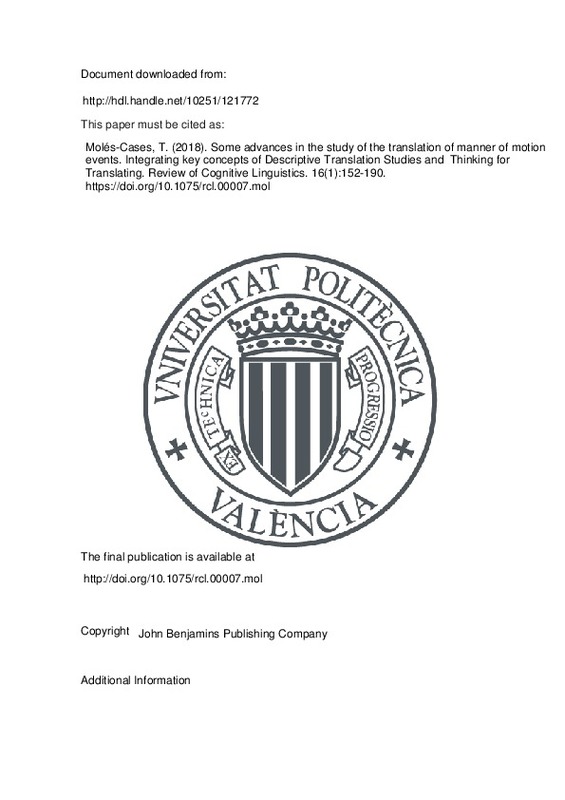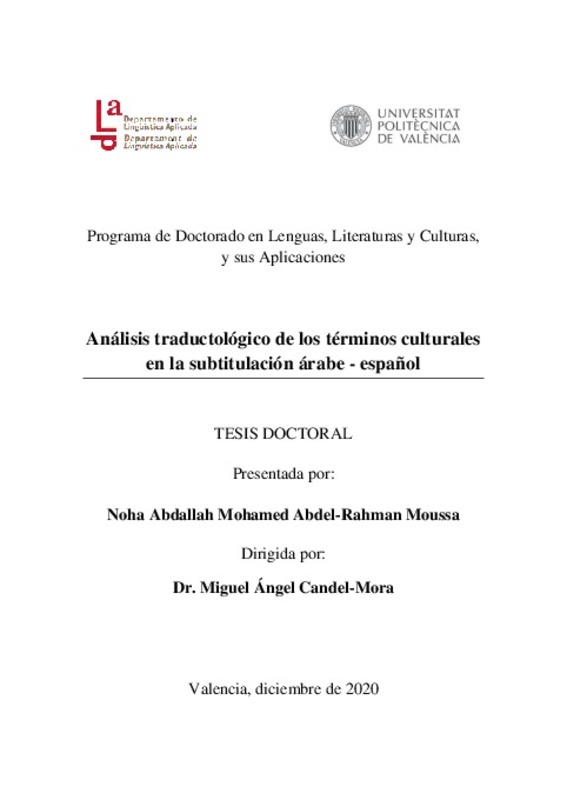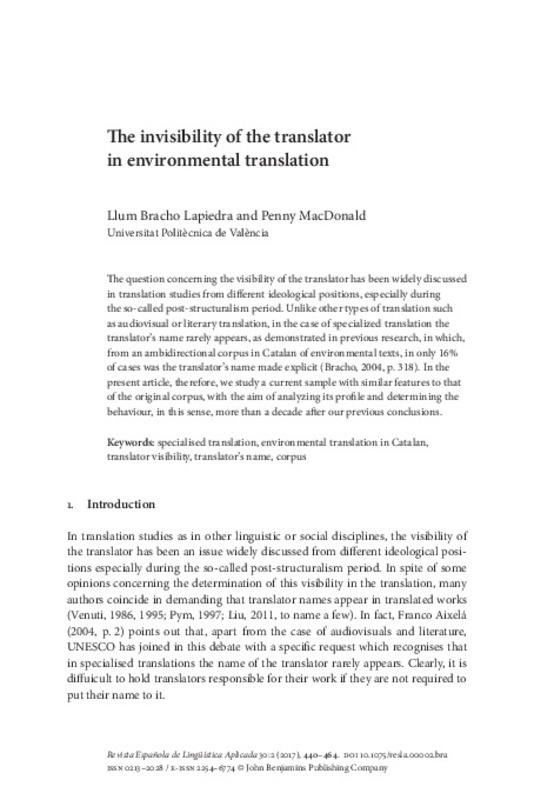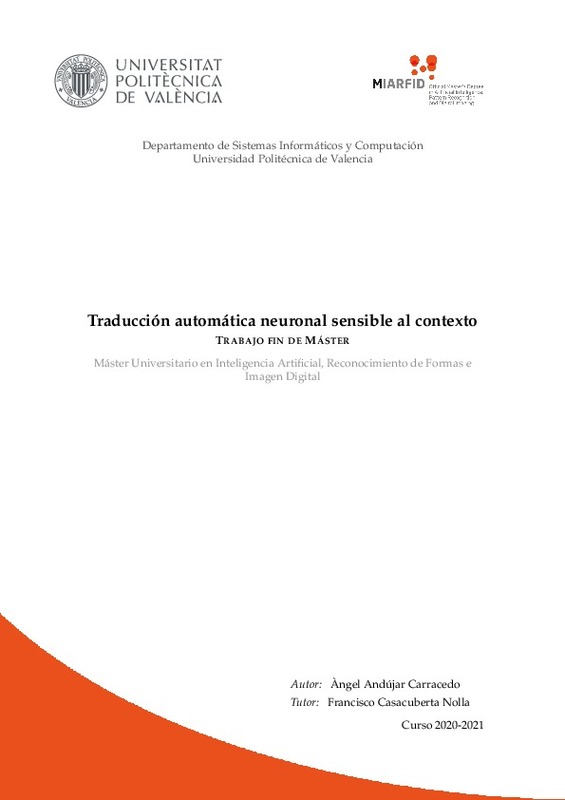JavaScript is disabled for your browser. Some features of this site may not work without it.
Buscar en RiuNet
Listar
Mi cuenta
Estadísticas
Ayuda RiuNet
Admin. UPV
Some advances in the study of the translation of manner of motion events. Integrating key concepts of Descriptive Translation Studies and Thinking for Translating
Mostrar el registro sencillo del ítem
Ficheros en el ítem
| dc.contributor.author | Molés-Cases, Teresa
|
es_ES |
| dc.date.accessioned | 2019-06-07T20:05:29Z | |
| dc.date.available | 2019-06-07T20:05:29Z | |
| dc.date.issued | 2018 | es_ES |
| dc.identifier.issn | 1877-9751 | es_ES |
| dc.identifier.uri | http://hdl.handle.net/10251/121772 | |
| dc.description.abstract | [EN] Manner of motion represents a translation problem, especially between languages that belong to different typological groups, since their users (in this case mainly authors and translators) address the semantic component of Manner in different ways. In order to give a full account of the translation of manner of motion events in a German>Spanish parallel corpus of children¿s and young adult literature, this contribution describes an interdisciplinary study by resorting to the theory of `Thinking for Translating¿ ( Slobin, 1997 , 2000 , 2005 ) and to the hypothesis of translation universals ( Baker, 1993 ; Mauranen & Kujamäki, 2004 ). It presents a proposal of seven translation techniques adapted to Manner of motion, as well as quantitative data regarding these techniques. Qualitative and quantitative data on the semantic subcomponents of Manner (speed, sound, motor pattern, etc.) are also included. The findings confirm that, in terms of Manner of motion, the translation is simpler than the original text and that motor pattern is the semantic subcomponent of Manner that has been affected by translation to the greatest extent. | es_ES |
| dc.description.sponsorship | The work for this paper was carried out within the framework of the Covalt research group and the research project "Los corpus en la ensenanza de la traduccion. Ampliacion y explotacion didactica del corpus COVALT", funded by Universitat Jaume I (P1.1B2013-44). I would also like to thank Dr. Ulrike Oster and the two referees for their valuable suggestions. | es_ES |
| dc.language | Inglés | es_ES |
| dc.publisher | John Benjamins Publishing Company | es_ES |
| dc.relation.ispartof | Review of Cognitive Linguistics | es_ES |
| dc.rights | Reserva de todos los derechos | es_ES |
| dc.subject | Manner of motion | es_ES |
| dc.subject | Translation techniques | es_ES |
| dc.subject | Thinking for Translating | es_ES |
| dc.subject | Corpus linguistics | es_ES |
| dc.subject | Translation universals | es_ES |
| dc.subject.classification | FILOLOGIA ALEMANA | es_ES |
| dc.title | Some advances in the study of the translation of manner of motion events. Integrating key concepts of Descriptive Translation Studies and Thinking for Translating | es_ES |
| dc.type | Artículo | es_ES |
| dc.identifier.doi | 10.1075/rcl.00007.mol | es_ES |
| dc.relation.projectID | info:eu-repo/grantAgreement/UJI//P1·1B2013-44/ | es_ES |
| dc.rights.accessRights | Abierto | es_ES |
| dc.contributor.affiliation | Universitat Politècnica de València. Departamento de Lingüística Aplicada - Departament de Lingüística Aplicada | es_ES |
| dc.description.bibliographicCitation | Molés-Cases, T. (2018). Some advances in the study of the translation of manner of motion events. Integrating key concepts of Descriptive Translation Studies and Thinking for Translating. Review of Cognitive Linguistics. 16(1):152-190. https://doi.org/10.1075/rcl.00007.mol | es_ES |
| dc.description.accrualMethod | S | es_ES |
| dc.relation.publisherversion | http://doi.org/10.1075/rcl.00007.mol | es_ES |
| dc.description.upvformatpinicio | 152 | es_ES |
| dc.description.upvformatpfin | 190 | es_ES |
| dc.type.version | info:eu-repo/semantics/publishedVersion | es_ES |
| dc.description.volume | 16 | es_ES |
| dc.description.issue | 1 | es_ES |
| dc.relation.pasarela | S\363068 | es_ES |
| dc.contributor.funder | Universitat Jaume I | es_ES |







![[Cerrado]](/themes/UPV/images/candado.png)




